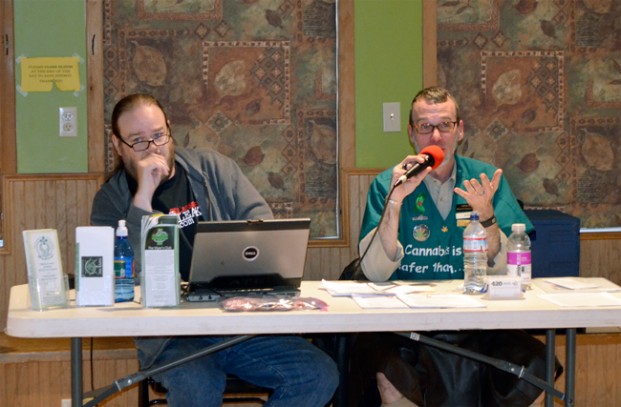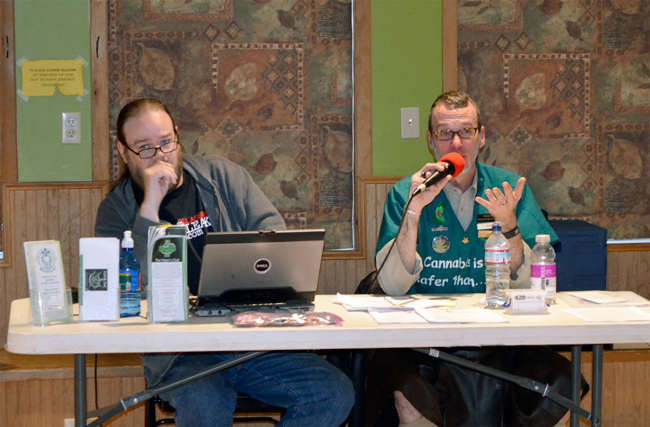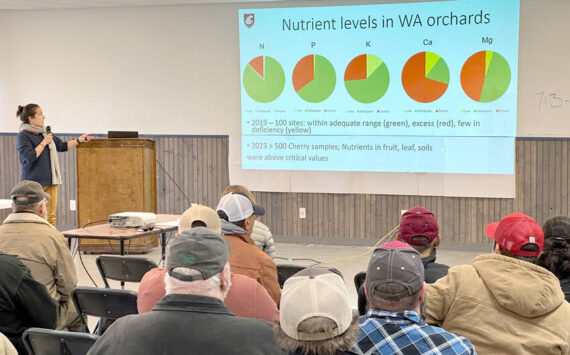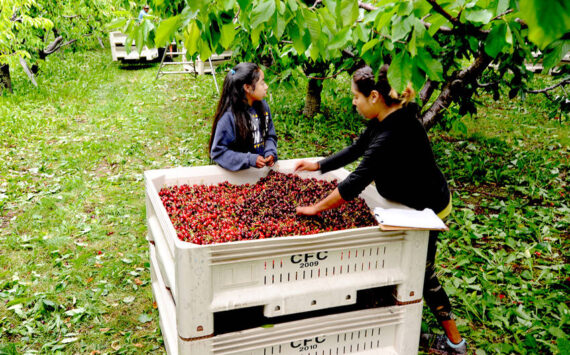
TONASKET – A public meeting held at the Community Cultural Center Wednesday, April 13, featured John Novak and Kirk Ludden, authors of Initiative 1419, answering questions from the public for over two hours.
“I-1419 is about fixing the cannabis laws in Washington State for patients, adults and the industry,” said Novak. “It’s a common sense initiative for everyone.”
The initiative, running under the tagline ‘Compassionate Use for Adults: No Victim, No Crime,’ needs 246,352 signatures collected by 5 p.m. on July 8 in order to be on the November ballot.
Novak said a similar initiative, I-1372, collected only 28,542 signatures last year.
Ludden said for voter protection, voters only needed to list their printed name and signature for a valid signature on any petition.
Key points of I-1419 include creating a medical-cannabis board for the not-for-profit market to oversee medical-cannabis specific issues, as well as evaluating all angles of patient health, protection and over all well-being.
I-1419 also calls for creating a recreational board for the for-profit market replacing the Liquor Control Board’s involvement with cannabis, and requires both boards to engage in open meetings to consider public input.
The initiative challenges the scheduling classification of cannabis as a Schedule 1 narcotic, and calls for removing the Medical Cannabis Patient Registry until Federal rescheduling.
Novak said I-502 (the initiative allowing recreational marijuana use) was written to treat cannabis like alcohol, yet the substances are not treated alike under the laws.
“We never had a patient registry before in this state, and there were no serious issues with the medical cannabis law; and then I-502 passed,” said Novak. “People who use alcohol and tobacco aren’t required to be on a registry, so why patients who buy cannabis? Now people can walk in and buy cannabis over the counter, so what are patients doing having to be put in a registry? The only way we could do a registry is if it is removed from the federal controlled substances act.”
Novak said other discrepancies were there were no limits on the amount of tobacco or alcohol a person could purchase or have at any given time; and adult home grows for cannabis were not allowed, yet making beer and wine at home were not an issue.
“We were told it would cut into the profits of the licensed growers,” said Novak. “Yet making beer and wine at home hasn’t hurt Budweiser any.”
The initiative calls for a restoration of private patient gardens, along with possession amounts determined by the DOH for a standard 60-day supply of 100 square feet of plant canopy and 35 usable ounces per patient. Ludden said larger allowances would enable patients to make salves, oils and tinctures.
Ludden said a public hearing was held Feb. 2, 2016 on HB 2629 which addressed home-grows. According to Ludden, Rep. Brian Blake was the main sponsor of the bill and Cary Condotta and Jessyn Ferrell co-sponsored it.
“We had a hearing with Representative Blake and brought in patients to testify. One woman gave her testimony on how her daughter has horrible seizures. She is under-two-years old, and the only thing that prevents them is is cannabis oil,” said Novak. “How can you say ‘no’ to a mother who just wants to keep her daughter alive? Two days later we heard from our sponsors of the bill, and they said, ‘try again next year.’ The Commerce and Gaming Committe chairman Rep. Christopher Hurst refused to call a committee vote and killed the bill.”
A video clip of the public hearing can be seen at http://www.tvw.org/watch/?eventID=2016021045.
“Meanwhile, the U.S. government has had a patent since 2003 to use cannabis in the treatment of a lot of diseases including Alzheimer’s and Parkinson’s, and to limit neurological damage caused by stroke or trauma,” said Ludden.
When an audience member asked about medical testing currently being done in the state on cannabis, Ludden said none was being done.
“There are no federal funds available for medical testing, and all medical research has to go through the DEA. That’s where they get the license to do the research, but they won’t allow licenses for cannabis research,” said Ludden. “That’s why they can say with a straight face, ‘there’s been no research done on that.’”
The initiative calls for protection of organ transplant patients from cannabis consumption being the sole disqualifying factor for transplant eligibility; and arrest protections and an affirmative defense for medical cannabis patients, providers and health care professionals who recommend cannabis.
“One of the key things we added in was to remove non-violent cannabis offenses from individuals’ criminal record, and to release all incarcerated non-violent cannabis inmates,” said Novak.
“How can we keep them in prison for doing something that we are now legally allowed to do?” asked Tonasket resident Morgan Davis, attending the meeting.
An audience member asked what they could do to learn more about the initiative and Ludden said their best option was to get on a weekly conference call Wednesdays from 7 to 9 p.m. by dialing 515-739-1020 and entering the access code 953064.
The question and answer session was preceded by an open-door conversation session from 3:30 p.m. to 5 p.m. followed by a potluck with music provided by The Railroad Track Boys. About 50 people attended the event.
The third author and Campaign Manager of the initiative, Stephanie Viskovich, was unable to attend due to a family emergency.
The meeting was sponsored by The People for Medical Cannabis in Washington State (thepeopleformedicalcannabis.com) and Davis.
To read the full text of I-1419, visit http://www.compassionatewa.org/ or at the Washington State Secretary of State website at http://sos.wa.gov/_assets/elections/initiatives/FinalText_933.pdf.
See Related:
County marijuana growers propose advisory committees
Planners hear pros and cons of local cannabis industry





